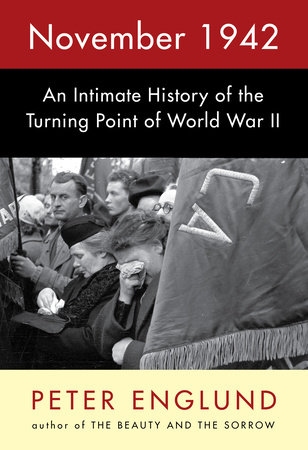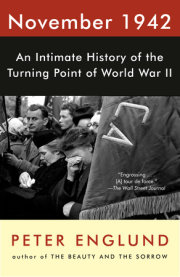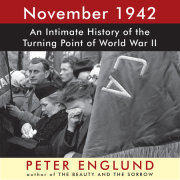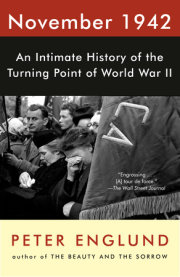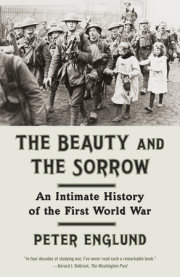"Swedish historian Englund takes a captivating firsthand look at a pivotal month of WWII by drawing on the diaries, letters, and memoirs of 39 people who lived through it...This gripping and propulsive account, expertly translated by Graves in lyrical prose, recreates the daily uncertainty of war as experienced by regular people with limited information and few resources. It’s a monumental work of history." —Publishers Weekly, starred review
"An astonishing achievement." —Antony Beevor, author of Stalingrad
"This engrossing book drops us—in medias res—into a brief period crowded with terrible events, [the] narrative woven from firsthand accounts of 39 individuals...Mr. Englund’s approach echoes Homer’s 'Iliad,' which tries to understand at once the mayhem of war, the forces that drive it and the feelings its violence leaves behind...A wide-ranging and nimbly moving narrative, offering a personal and panoptic view of one convulsive month.... Mr. Englund’s tour de force casts a long shadow into our present—and its raw voices haunt me still."—Karin Altenberg, The Wall Street Journal
"Absolutely revelatory. A stunning tour de force. So much in here that is truly fresh and new. Englund chronicles the gripping tale of one month that changed everything in WWII, and it is so beautifully written and timeless. Once read, you'll want to return to this again and again." —Damien Lewis, author of Agent Josephine
"[The] format [of November 1942] ensures an extraordinary — and bewildering — range of striking details...As one progresses through these fragments of disparate experiences, it becomes possible to recognize and pick up the threads of the individual lives. Of more importance, the reader has come to a point where picking up the threads no longer matters. In short, we have come to the very place Englund was steering us: an acceptance of the impossibility of making sense of the events...[W]ith a scrupulous and skillful hand [Peter Englund] has created an original panorama of humankind’s most destructive war."—Caroline Alexander, The New York Times Book Review
"Englund's style is novelistic....his wide variety of sources means he achieves his aim of giving a broad picture of total. [November 1942] is a book thoroughly worth reading." —Simon Heffer, The Telegraph
"[Peter Englund] is a student of mankind and womankind, and fulfils that role with considerable success...[offering] many thought-provoking insights...His works gain their impact from the interweaving of experiences between individuals, continents and battlefields. He understands that soldiers at war spend more time digging than killing each other; and that the pursuit of food, and of hope, are universal obsessions...Englund’s book, and his cast of characters, deserve an audience, to increase knowledge not only of this particular war, but also of the stupendous sacrifices and tragedies of all human conflicts"—Max Hastings, The Sunday Times
"Majestic...This is an extraordinary evocation of a pivotal moment in the 20th century. Englund captures not only the gnawing tension, the moments of terror and the flinty endurance but also the fractal complexity of this global conflict. Resonantly written and utterly gripping, this book will stay with you." —Sinclair MacKay, author of Berlin
"Swedish historian [Peter] Englund’s The Beauty and the Sorrow amplified and changed the history of WWI. Now, he applies these same talents to the history of WWII, focusing on a single month...Using present tense, Englund lends immediacy and potency to these extraordinary wartime accounts...This is history seen from beneath—ordinary individuals in wartime, both acting and being acted upon."—Booklist, starred review
"By interweaving the detailed experiences of 40 individuals from all parts of the conflict, Englund presents an extraordinary panorama of this pivotal moment. A haunting narrative imaginatively conceived, brilliantly told." —Julia Boyd, author of Travelers in the Third Reich
"A meticulous chronicle of ordinary people in the extreme circumstances of war."—Kirkus Reviews

